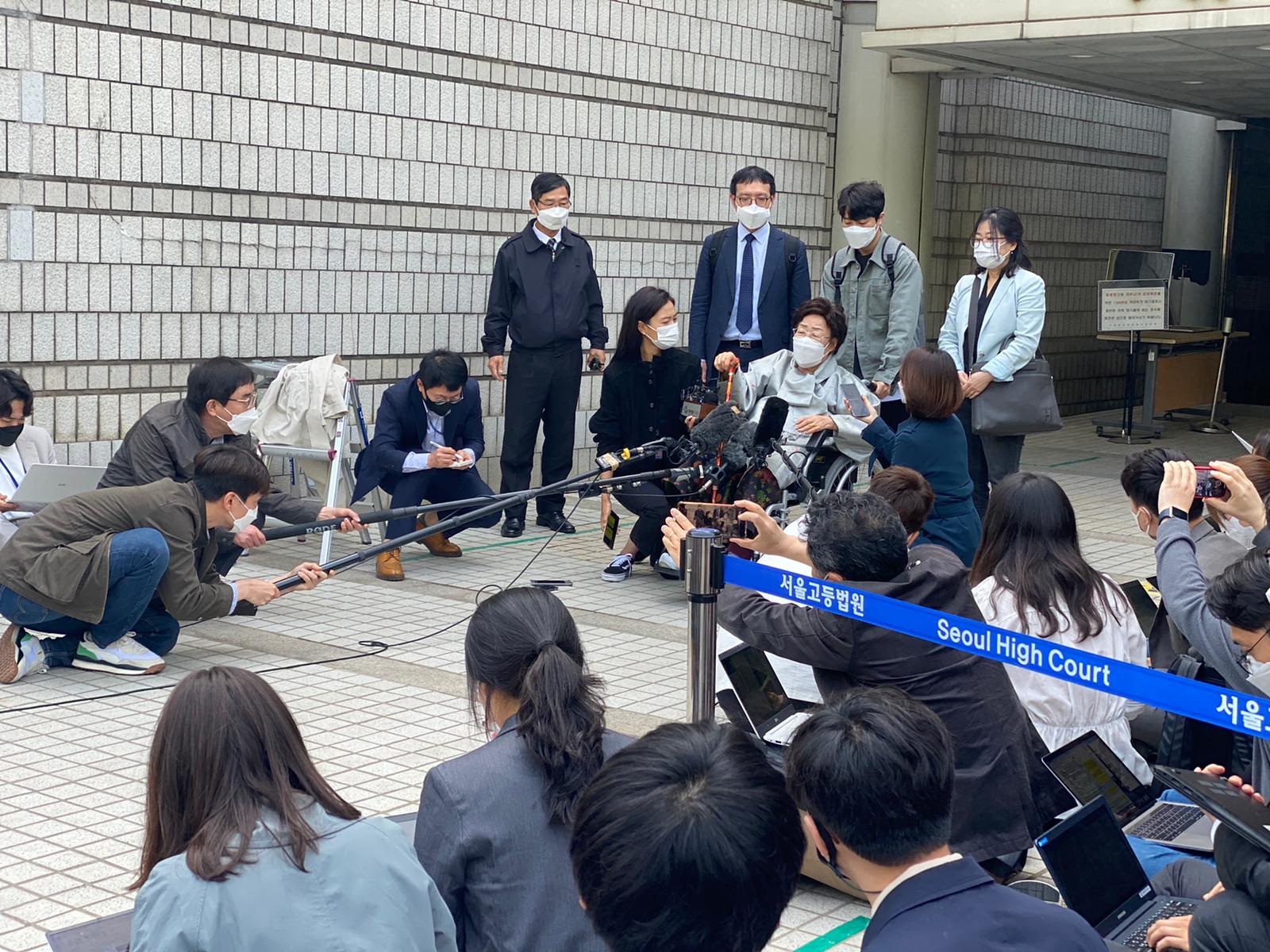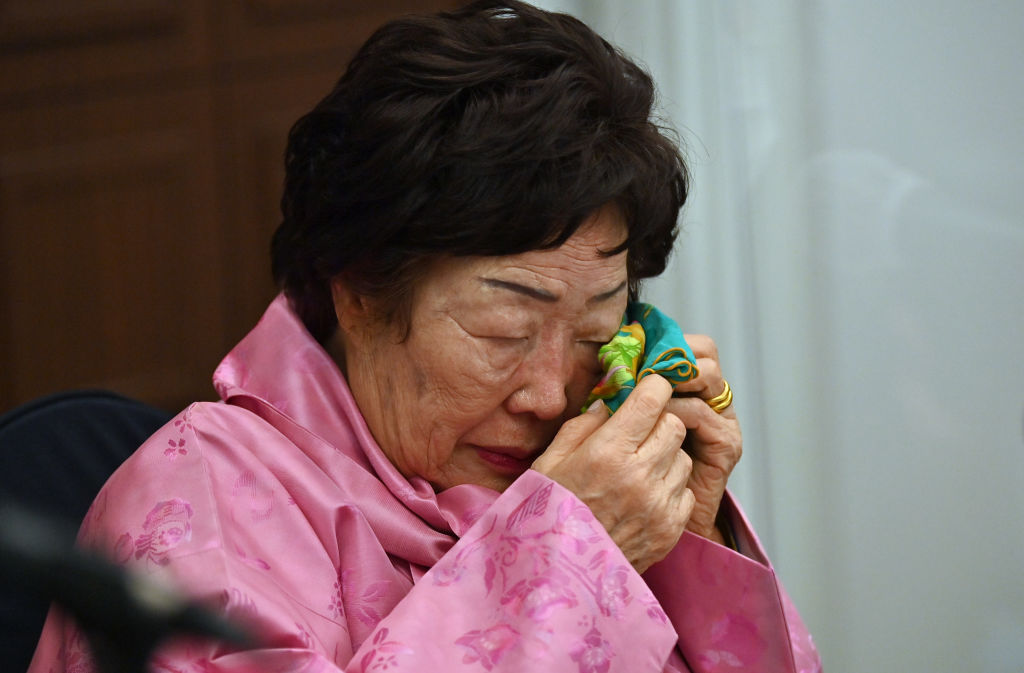SEOUL, South Korea—Lee Yong-soo seemed to shiver with frustration as an activist wheeled her out of the Seoul Central District Court in a wheelchair. The 92-year-old Korean woman, who survived Japanese military sexual enslavement as a teenager during World War II, gripped her red cane and faced the crowd of reporters.
She was noticeably distraught—and understandably so.The court had just issued what activists and human rights groups say is a devastating blow to decades-long efforts to seek justice for so-called “comfort women”—but which the judge described as a victory for international diplomacy.
In a packed courtroom on the morning of April 21, Judge Min Seong-cheol said in his surprise dismissal of the civil suit filed by 20 survivors and their family members that a “diplomatic clash would [have been] inevitable” if an exception to Japan’s state immunity was upheld. The judge thus embraced an argument made repeatedly in public by the Japanese government—and one that may have had the support, for the sake of regional stability, of the Biden administration in Washington.
In issuing his verdict, Min contradicted the court’s landmark decision in a case from January that had ordered the Japanese government to pay 12 Korean survivors roughly $91,800 each. It was the first domestic court case of its kind that demanded compensation and legal responsibility from Tokyo for wartime crimes against women and girls raped and forced into sexual servitude by Japanese forces. Survivors and historians say Japanese forces raped, enslaved, sterilized, tortured, and killed hundreds of thousands of Asian women and girls like Lee, most of them Korean, during Japan’s colonial rule of Korea until the end of World War II. Seventy-six years later, Lee is one of only 15 registered Korean survivors still alive.
Despite the verdict, Lee said she will seek out other avenues for justice. “We will go to the International Court of Justice (ICJ),” she said, referring to the United Nations’ main judicial court at The Hague.

The case had thrust the two countries’ ailing bilateral ties back into the spotlight, complicating renewed U.S. efforts to unite allies in Seoul and Tokyo to counter China as a global competitor to Washington and manage North Korea and its nuclear arms arsenal, which U.S. President Joe Biden has said is his administration’s top foreign-policy issue. The case’s dismissal puts a spotlight on the political and diplomatic hurdles that survivors of wartime sexual violence and rape anywhere in the world—from Sarajevo to Seoul—face as they seek what they say is justice.
In January, Japanese Prime Minister Yoshihide Suga called on South Korea to drop the case. The country refused to take part in the trial, citing sovereign immunity—international legal doctrine that says a state is immune from another country’s legal jurisdiction. The Seoul Central District Court had rejected Japan’s claim of sovereign immunity, saying the country “violated international norms by committing intentional, systematic, and wide-ranging inhumane criminal acts.” But on April 21, the court—and a new judge—used sovereign immunity as the basis for the decision to dismiss the complicated and controversial case.
Japan has apologized at numerous points in history for its treatment of so-called “comfort women” but stops short of accepting legal responsibility. The country maintains the issue was resolved as per a 1965 treaty that established diplomatic relations between Japan and South Korea. Tokyo provided hundreds of millions of dollars in economic assistance and loans to Seoul as a settlement. Japan says the two countries had reached a “final and irreversible resolution” in Seoul in 2015. As part of the joint agreement, Japan “painfully acknowledge[d] its responsibility” and promised $8.3 million in government funds to back projects supporting former “comfort women.”
But survivors and human rights groups say the bilateral agreement didn’t go far enough in terms of Japan accepting legal responsibility and did not include survivors at the negotiating table. South Korean President Moon Jae-in has said the 2015 agreement was flawed and “cannot solve the comfort women issue.” In 2019, Moon dissolved a Japanese-funded foundation set up under the agreement, prompting outcry from Tokyo.
The 2015 agreement was a “stubborn political agreement that excluded victims,” said a spokesperson for the Korean Council for Justice and Remembrance for the Issues of Military Sexual Slavery by Japan, also known as the Korean Council, in an email on behalf of the organization. The Seoul-based organization said it aims to prevent future wartime sexual violence through remembrance, education, legal reparations, and other means. (The organization came under fire in 2020 when survivor and activist Lee Yong-soo accused the Korean Council of exploiting the cause and misusing funds, prompting an investigation into Yoon Mee-hyang, the organization’s former head who stepped down in April 2020 after winning a seat in parliament. The Korean Council has apologized for what it said are “banking errors.”)
Although the United States has not commented on the court case and most recent tensions surrounding the “comfort women” legacy, Biden is expected to work on repairing South Korea-Japan relations through diplomacy, similar to when “President Obama pressured Korea to improve relations between Korea and Japan,” said Lee Shin-wha, a professor of political science and international relations at Korea University in Seoul. The outcome, with Moon’s conservative predecessor Park Geun-hye, was the 2015 “comfort women” agreement, which the United States applauded as a step in the right direction at the time.
After Biden’s inauguration, the president sent his top envoys to Tokyo and Seoul in March for the administration’s first overseas diplomatic meeting. “It’s no accident that we chose the Republic of Korea for the first cabinet-level overseas travel of the Biden-Harris administration, along with Japan,” said U.S. Secretary of State Antony Blinken in Seoul on March 17.
On April 16, Biden met with Suga at the White House. It was the first in-person meeting of Biden’s presidency with a foreign leader. In their press conference and readouts, both Biden and Suga touted the “unwavering” alliance between Washington and Tokyo as well as threats they—and regional partners Australia and India, otherwise known as the Quadrilateral Security Dialogue—face from China and North Korea. Neither leader mentioned Washington’s other close ally, South Korea.
The U.S. State Department declined a Foreign Policy interview request with Sung Kim, the top department official overseeing East Asia and Pacific affairs, on the matter of the “comfort women” and U.S.-Japan-Korea relations.
The United States has an obligation to responsibly respond to the court case and wider calls for justice, considering its own damning legacy with “U.S. military comfort women,” said a Korean Council spokesperson in an email. Since the end of World War II, U.S. servicemen have helped fuel and taken part in sex work, trafficking, and exploitation of Korean and other Asian women around U.S. military bases in the region. In February 2018, a Seoul court ordered Seoul pay more than half a million dollars to 117 surviving plaintiffs who served as sex workers in “camp towns” around U.S. bases in the 1950s, saying South Korea violated its citizens’ human rights and actively encouraged prostitution to benefit the U.S. military alliance.
Every week, for 29 years, protesters in Seoul have gathered to demand justice for former “comfort women.” On Wednesday, hours after the court ruling, protesters gathered outside of the Japanese Embassy in Seoul, as they do every Wednesday, and took their places next to a bronze statue of a Korean girl with bare feet, her eyes fixed squarely on the embassy. A woman placed a bright yellow sign on the statue’s lap. It read 1,488—the number of protests demanding justice since 1992.
Police lined the street as counter-protesters, some of whom say the “comfort women” narrative is a fraud, shouted over speakers. Despite decades of well-founded and widely accepted historical research into the experience of women and girls sexually enslaved by Japanese forces, Japanese scholars and critics—as well as, most recently, a Harvard professor slammed for historical revisionism—have argued women and girls forced into military brothels entered into prostitution willingly.
The debate over what justice looks like is not just an issue of resolving the legacy of “comfort women” but also Japan’s colonial legacy as a whole. Japan forcibly conscripted hundreds of thousands (if not millions, according to some South Korean sources) of Koreans into fighting and laboring across Asia before and during World War II.
“It’s not correct to describe these historical issues as a diversion or sideshow,” said Jacob Stokes, an expert on East Asian security with the Center for a New American Security and a former White House national security staffer for Biden during the Obama administration. “They’re so important to the fundamental question of what kind of regional order you are building.”
Washington is struggling with how to address the issue or even whether to address it at all, experts said, as it tries to carefully balance alliances and counter China, address priorities in Tokyo and Seoul, and weigh geopolitics against domestic politics in both capitals.
The politics of patriotism continue to play important roles in both Japan and South Korea, and it’s unlikely tensions between the two countries over World War II-era atrocities will fade away over time, said Sheila Smith, a senior fellow for Japan studies at the Council on Foreign Relations, a U.S.-based think tank.
Even as the last members of the generation that survived World War II pass away, the horrors they faced have become “part of the firmament of South Korean politics,” Smith said.
Those tensions are now complicating other aspects of the relationship, including trilateral ties with Washington and renewed U.S. efforts to strengthen alliances across the Indo-Pacific region to counter China and rein in North Korea’s nuclear capability.
“You’ve watched the historical legacy issues that have always been there in different forms or fashion, now spilling out into the economic relationship, which has always been very strong, and now spilling into the security and alliance relationship with the United States,” Smith said.
Historically, efforts to prosecute wartime sexual violence, including war crimes and crimes against humanity, around the world have been largely unsuccessful. The past 25 years, in particular, have seen the issue of conflict-related sexual violence elevated in local and international courts. Yet progress has been slow.
Such cases are difficult to prosecute and are often sidelined due to political pressure and inability to gather sufficient evidence due to the length of time—sometimes decades—that passes between when crimes are committed and when they are tried in courtrooms. Prosecuting wartime sexual violence often requires more money, more legwork, and more fortitude than other crimes.
Since the end of World War II, survivors of Japanese wartime sexual enslavement have filed lawsuits against Japan in Japanese courts across Asia—including South Korea, the Philippines, Taiwan, and China—as well as the Netherlands, according to Amnesty International. None have succeeded.
Survivors, now in their 80s and 90s, and activists say they will stop at nothing to seek justice. “Time does not wait for the victims,” said activist Choi Jun-hyuk, who accompanied Lee to the trial.
He slammed the Japanese government, the Korean government, and the Korean judiciary for failing to support survivors like Lee.
“We need to get to the ICJ as soon as possible and seek justice,” he said.
Correction, April 22, 2021: The original version of this piece erroneously identified a spokesperson for the Korean Council.


 Seulki Lee
Seulki Lee
